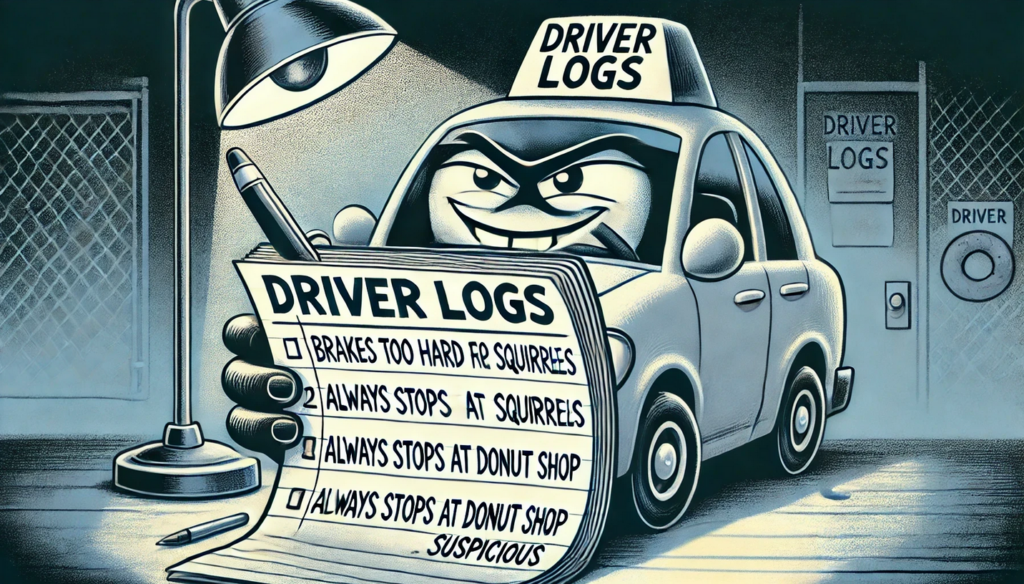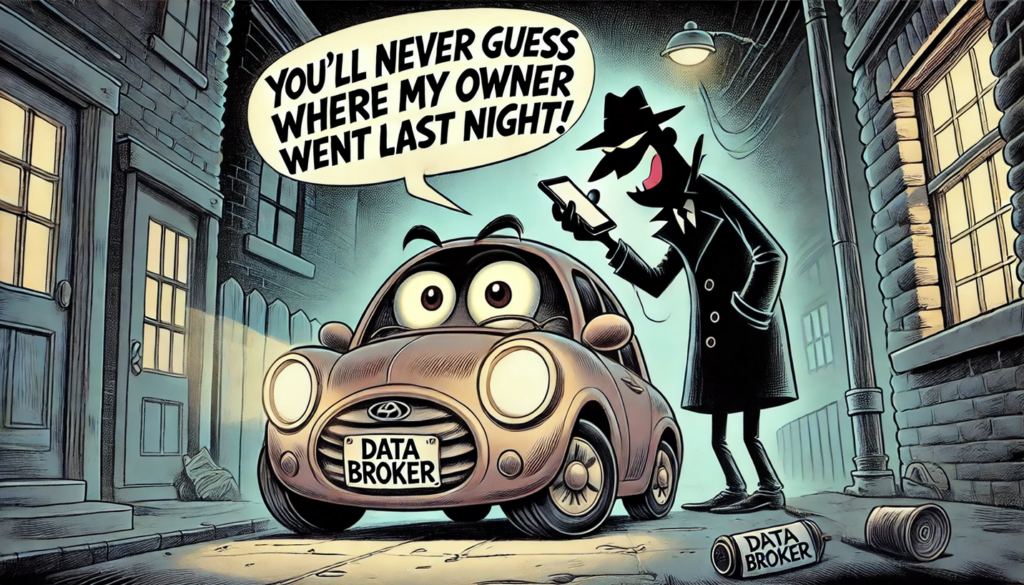
Newsletter Subscribe
Enter your email address below and subscribe to our newsletter

Did you know your car might know more about you than your closest friends? It’s true.
While your best friend might forget your birthday or what kind of coffee you like, your car? It remembers everything.
How fast you drive, where you go, how hard you brake, maybe even how many times you’ve belted out “Sweet Caroline” at a red light.
Welcome to the age of the “snoopy car”—where vehicles aren’t just modes of transportation anymore. They’re data-collecting spies on wheels. And unlike a good old-fashioned nosy neighbor who peeks through the blinds, your car isn’t just being curious—it’s taking notes.

Modern cars are loaded with enough sensors, cameras and smart features to make James Bond jealous. But all that fancy technology comes with a catch: your car is collecting massive amounts of data about you.
And in many cases, that data isn’t just staying under the hood—it’s getting sent to manufacturers, insurance companies, and third-party data brokers faster than you can say, “Wait, I never agreed to this!”
What’s particularly concerning is that car manufacturers aren’t exactly forthcoming about what they’re collecting or what they’re doing with all this information. They’re about as transparent as your windshield after a dust storm.
And just like you wouldn’t hand your house keys to a stranger, it’s worth knowing who has access to your daily driving diary.
So buckle up, dear readers. It’s time to learn what your car knows about you, who it’s telling, and most importantly, how to put the brakes on your four-wheeled friend from becoming the biggest gossip in town.

Back in the day, the only thing your car remembered was your favorite radio station. But modern cars? They have the memory of an elephant and the curiosity of a gossip columnist.
Your car doesn’t just get you from point A to point B—it keeps a detailed journal of everything you do behind the wheel. Here’s a look at what’s getting logged:
Not all cars are snoopy in the same way. Some manufacturers just want to know if your engine is running smoothly. Others, well… they want a little more.
Let’s take a look at some specifics:
😱 Nissan: One review found that Nissan’s data policy mentions tracking sexual activity, health diagnosis data, and genetic information. Kia’s policy also mentions they can collect info about your “sex life.” (Though how car companies get this data and why they need to know about your sex life and genetic information to help you parallel park is anybody’s guess!)
🚗 General Motors: Many GM vehicle owners found themselves unwittingly enrolled in OnStar Smart Driver, a program that shared their driving data with consumer reporting agencies (which insurance companies can potentially access). The FTC took action and this program was discontinued in early 2024.
🚗 Hyundai & Kia: Record voice data and share it with third-party companies like Cerence, which specializes in AI-powered voice interactions.
🚗 Tesla: Collects video clips recorded by cameras inside and outside the car, allegedly to improve their self-driving systems (they say user consent is required for this). That means your car might have front-row footage of your impromptu dashboard karaoke session.
🚗 Ford & Toyota: Stick mostly to vehicle performance data, which is slightly less invasive—but still means they know when you’ve ignored that “check engine” light for six months.
The real kicker? Unlike your grandchildren’s social mediaSocial media refers to online platforms and websites that enable users to create, share, and interac... More posts that you can choose not to look at, there’s precious little choice about whether your car collects this information. It’s happening whether you like it or not.
Now, you might be thinking: Okay, my car is nosy, but is that really a problem?
Short answer: Yes.
Here’s a few reasons why:
If you ask car manufacturers why they’re collecting all this data, they’ll tell you it’s all for your benefit (like when your mother insisted cod liver oil would make you stronger).
They want to improve your driving experience and enhance safety—which sounds great, right? But dig a little deeper, and you’ll find that while part of that is true, it’s not the whole story.
Manufacturers claim they use all this data to:
But here’s where things get about as murky as a mud puddle in spring: Much of this collected data isn’t just staying between you and your car manufacturer. It’s being passed around like a plate of cookiesCookies are like tiny reminder notes that a website sticks on your device through your browser. They... More at a church social – except you didn’t bake these cookies, and you certainly didn’t agree to share them.

Let’s talk a little more about where your car’s treasure trove of information might go:
🔍 Insurance Companies: As we’ve already mentioned, if you’ve ever wondered why your insurance premium jumped even though you haven’t been in an accident, your car might be the tattletale.
💰 Data Brokers & Third Parties: Many car manufacturers sell driver data to data brokers, who then package it up and resell it to whoever’s willing to pay—advertisers, corporations, and others.
🚔 Law Enforcement Requests: Some car companies willingly hand over driver data to law enforcement without requiring a warrant. If you think your phone is the only device that can be used to track you, think again—your car might already be volunteering your whereabouts.
Here are just a few of the red flags all this data collection and sharing raises:
🚩 Lack of Clear Communication – Most drivers aren’t aware of what data their car is collecting, let alone where it’s going. The details are buried deep in the fine print of your owner’s manual (right next to the section on proper tire pressure, which no one has read in the history of car ownership).
🚩 Vague or Nonexistent Opt-Out Options – Even if you do find out your car is collecting data, disabling it isn’t always simple. Some features don’t allow full opt-out, and others require calling customer service and jumping through so many hoops you might as well join the circus.
🚩 How Secure Is Your Data? – Many companies collect and store your data without clearly explaining how it’s protected. Given how often major corporations suffer data breaches, that’s not exactly reassuring.
At the end of the day, most of us have no idea where all this information ends up or how long it’s stored. It’s like throwing your personal diary into the wind and hoping it lands somewhere safe.
Car manufacturers aren’t required to tell us who they’re sharing our data with or how they’re protecting it. And in today’s digital age, that’s about as comforting as a screen door on a submarine.
So, what are the risks here? In this section, we cover them and the reality many drivers are only just waking up to.
🚨 Privacy Concerns: Your Car Knows Too Much
Your car isn’t just collecting information about your driving—it’s collecting information about you.
📍 GPSThe Global Positioning System (GPS) is a technology that uses satellites in space to find your locat... More Tracking Gone Wild – Your car records every place you’ve been, from your morning coffee stop to your late-night fast-food run you’d rather not admit. And if you think that information is staying between you and your vehicle, think again—data like this can be shared or sold to third parties.
📱 Your Phone’s Data Is Up for Grabs – If you’ve ever synced your smartphone to your car’s system (for hands-free calling, navigation, or music), your car may have copied more than you intended. Many modern vehicles can download"Download" means saving something from the internet onto your device—like your phone, tablet, or c... More:
That means if you ever sell or trade-in your car without wiping this data, someone else could access all of it. And yes, that’s just as creepy as it sounds.
🛑 Security Risks: Can Your Car Be Hacked?
If your car is basically a rolling computer, that means it can also be hacked like one.
💻 Potential for Unauthorized Access – CybersecurityCybersecurity is a critical field dedicated to safeguarding digital systems, networks, and data from... More experts have warned for years that connected cars are vulnerable to hacking. And while hacking a vehicle used to mean hotwiring the engine like in an action movie, today’s cybercriminals can remotely access vehicle data, disable functions, or even track a car’s location.
🗄 Where Is Your Data Even Stored? – Here’s a fun fact: nobody seems to know. Car companies collect massive amounts of driver data, but their data storage policies are often vague at best. Is it encrypted? How long is it kept? Who else can access it? These are questions that should have clear answers—but rarely do.
🚓 Government Access: Your Car as an Informant
Most of us grew up believing that law enforcement needed a warrant to access private information. Unfortunately, your car never got that memo.
Many car manufacturers’ own policies state that they will voluntarily hand over driver data to law enforcement upon request—no warrant necessary. That means:
This isn’t just hypothetical—it’s already happening. Investigators have used car data to reconstruct accidents, prove (or disprove) alibis, and even access conversations recorded inside vehicles. And while that might sound useful in criminal cases, the bigger issue is that most drivers don’t even realize this data is being collected and shared in the first place.
So, to sum up: your car knows where you’ve been, remembers who you’ve called, and might be willing to spill the beans to anyone who asks nicely enough.
Don’t worry – you don’t need to go back to riding a horse and buggy to protect your privacy. There are several ways to at least limit your smart car from being a blabbermouth, and I promise none of them involve crawling under the hood with a wrench (well, mostly).
Here’s how to put the brakes on unwanted surveillance.
Car companies aren’t exactly shouting from the rooftops about their data collection practices. But if you dig deep enough—usually in your owner’s manual or through the manufacturer’s mobile app—you’ll find information about what your car is tracking and where that data is going.
✅ Check your car’s privacy settings. Some models let you adjust what gets recorded or shared.
✅ Look for hidden data-sharing agreements. Some features automatically enroll you in data collection programs (cough OnStar Smart Driver cough).
If you’re feeling really ambitious, try searching for your car’s privacy policy online—you may be surprised (and horrified) at what you find.
Bonus tip: If you can find the policy online, copy it and put it into ChatGPTChatGPT is an advanced language model developed by OpenAI, designed to understand and generate human... More. Then, ask GPT to look for a summary of privacy, data collection, tracking, etc., concerns in the policy.
You wouldn’t sell your old smartphone without erasing your photos, texts, and cat videos, right? Well, your car stores just as much personal data.
Privacy4Cars is a tool that helps you delete personal information from your vehicle before you sell or trade it in. It walks you through the steps to:
Trust me, you don’t want to hand over your car and your personal history to the next driver.
If you don’t use a feature, turn it off. Some of the most data-hungry settings include:
The fewer things you have switched on, the less data your car is collecting—and the less it has to share.
Many car manufacturers offer some way to opt out of data collection—but they don’t make it easy.
📞 Call customer service and ask to opt-out. (Be prepared for some pushback.)
📧 Request an official confirmation in writing that your data-sharing preferences have been updated.
📄 Check the terms & conditions of your car’s connected services and look for opt-out clauses.
🚨 Important: Some services may stop working if you opt-out—so if you really love your remote start feature, double-check what you’re disabling.
If you’re tech-savvy and really serious about cutting off your car’s ability to “phone home,” you can remove the Data Communication Module (DCM).
Why would you do this?
⚠️ Warning: Before you go pulling fuses, research your car’s specific model to make sure you’re not disabling something critical (like your ability to call for roadside assistance).
🚗 📱 If you connect your phone to your car via Bluetooth or USBUSB, or Universal Serial Bus, is a type of connection used to link devices. It simplifies the proces... More, your car may download and store:
To avoid this:
✅ Manually delete stored data from your car’s infotainment system.
✅ Use “guest” mode (if available) when syncing a phone temporarily.
✅ Limit permissions when setting up phone pairing (some cars let you sync only music, not contacts).
The modern car is nothing short of a technological marvel. It can warn you when another vehicle is lurking in your blind spot, automatically brake to prevent a fender bender, and even tell you where you parked when you inevitably forget (which, let’s be honest, is more useful than we’d like to admit).
But all this convenience comes at a cost—and that cost is your privacy.
There’s no denying that connected vehicles make driving safer, easier, and sometimes downright fun.
Want to warm up your car from inside the house on a cold morning? There’s an appAn app (short for application) is a program that helps you do specific tasks on your smartphone, tab... More for that.
Need directions without fumbling with a map the size of a small bedsheet? Your car’s got built-in navigation.
But just know that every one of these features runs on a system that’s constantly collecting, storing, and sometimes sharing data about you.
And while manufacturers claim it’s all about enhancing your driving experience, the reality is that this data is often being sold, shared, or handed over without your knowledge.
The good news? You don’t have to give up all your privacy to drive a modern car.
Here’s a summary of what you can do right now:
✔ Check your car’s privacy settings—many have options to limit data sharing.
✔ Use tools like Privacy4Cars to wipe personal data before selling or trading in.
✔ Opt out of data collection programs—yes, it’s a hassle, but worth it.
✔ Be cautious with what you sync—your car doesn’t need access to everything on your phone.
✔ Disable features you don’t use—no need to give manufacturers extra data.
Technology is only going to get more advanced, which means the battle for privacy is just beginning. Laws and regulations are playing catch-up, but in the meantime, drivers need to take control of their own data.
Because at the end of the day, your car should take you places—not take your personal information along for the ride.